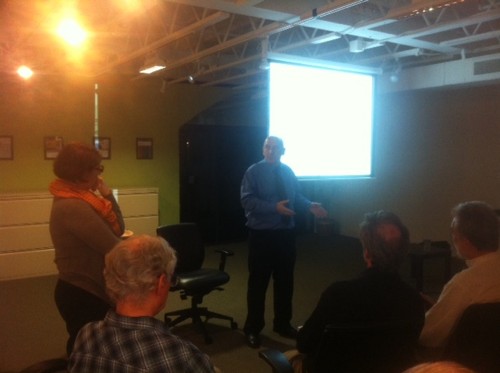“Can we find patterns today that point to the future?”
On Monday, October 24, Michel Bauwens of the Foundation for Peer-to-Peer Alternatives spoke at the Institute for the Future (IFTF) in Palo Alto about how the innovations and values of P2P are enabling a third revolution in human productivity and transforming capitalism. In a talk presented by Shareable and the IFTF, Bauwens argued that the Fordist model of managing society has reached its end and that the P2P model represents a much more productive and egalitarian system of production. Some takeaways from his talk:
-
We are living through the third revolution in human productivity.
• 1st revolution: coercion, slavery, etc — motivation extrinsic and negative.
• 2nd revolution: capitalism — motivation based on self-interest.
• 3rd revolution: invention of a system that allows us to self-aggregate our labor, built upon a task-based distribution of labor and aggregated contributions. In this system, the motivations are intrinsic and positive.
-
We have reached “peak hierarchy”.
• Complex societies simplify hierarchy, and hierarchy trumps equality.
• The P2P model, exemplified by projects such as Linux and Wikipedia, upends this hierarchical system using distributed networks.
- Peer production is a hyper-productive, incipient mode of production.
- "When the old system starts crumbling, you have to move from the bottom up.”
- We can’t get too concerned about corporate entities co-opting and reducing the effectiveness of the P2P movement. Just because Facebook and Google invest in these things, doesn’t mean that they can’t still turn the system inside out.

-
Asymmetric Competition
• In a competition between a for-profit entity with closed proprietary strategies, and a for-benefit institution working with a community and a commons, the latter will tend to win out.
• In a competition between for-profit companies, those using open/free, participatory, and commons oriented strategies will tend to win out.
• Capitalism is peer production, and currently, peer production is capitalism.
-
Bauwen proposes that to move to an autonymous mode of production, it must be self-sustainable.
• We must create global peer-based economies.
• We have more people in the world working for co-ops than international corporations.
• “Today, society says value is created in the market. Imagine a society where you extend a civil society where peer production is the basis of the market.
• Peer-to-peer production will form the core of the new capitalist system.
• Within the existing system, we have to create a counter-system. The current one is not going to last.
- On Occupy Wall Street: all previous social movements were based on old paradigms. Occupy Wall Street is truly new, the native expression of those who have internalized the values of the Internet.
- Co-optation by large corporations is less of a danger now than it was in the ’60s. There are now less reasons to be co-opted, because there are no jobs to co-opt with.









